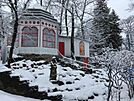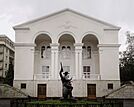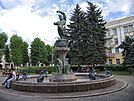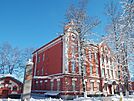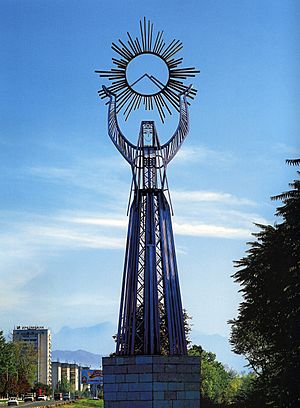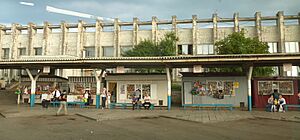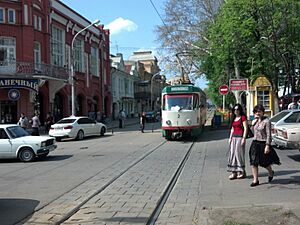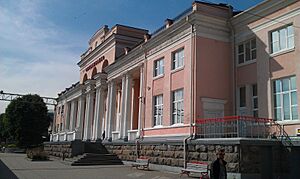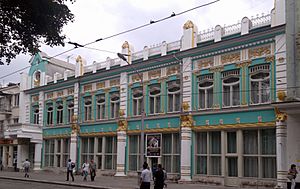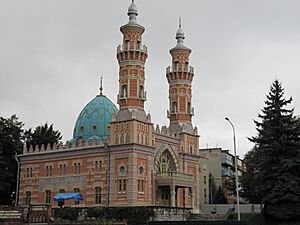Vladikavkaz facts for kids
Quick facts for kids Vladikavkaz (English)Владикавказ (Russian) Дзӕуджыхъӕу/Дзӕуӕгигъӕу (Ossetian) |
|
|---|---|
| - City - | |
| [[File:
|250px]] Terek River view, Bai Gora in Kosta Khetagurov Park, Musical theatre, Dzaugu Búgulov statue, Sunni mosque at night, Lutheran church, Symbol of Vladikavkaz, Train station, Corner of Prospekt Mir and Gogol, Monument to Nart Soslan on Prospekt Mira, Learning Campus |
|
|
|
|
| City Day | September 25 |
| Administrative status | |
| Country | Russia |
| Federal subject | Republic of North Ossetia–Alania |
| Administratively subordinated to | Vladikavkaz City Under Republic Jurisdiction |
| Capital of | Republic of North Ossetia–Alania |
| Municipal status | |
| Urban okrug | Vladikavkaz Urban Okrug |
| Head | Boris Albegov |
| Representative body | Assembly of Representatives |
| Statistics | |
| Area | 291 km2 (112 sq mi) |
| Population (2010 Census, preliminary) |
311,693 inhabitants |
| - Rank in 2010 | 60th |
| Density | 1,071/km2 (2,774/sq mi) |
| Founded | May 6, 1784 |
| City status since | 1860 |
| Postal code(s) | 362000 |
| Dialing code(s) | +7 8672 |
| Official website: http://vladikavkaz-osetia.ru | |
Vladikavkaz is a major city in Russia. It is the capital of North Ossetia–Alania, a republic within Russia. The city is located in the beautiful foothills of the Caucasus mountains, right on the Terek River.
With over 295,000 people living there in 2021, Vladikavkaz is one of the biggest cities in the North Caucasus area. It's an important place for factories and transportation. Things made here include metals like zinc and lead, machines, chemicals, clothes, and food.
Contents
What's in a Name?
The name Vladikavkaz comes from Russian words. It means "ruler of the Caucasus". The local Ossetian name for the city is Dzæwdžyqæw or Dzæwægighæw. This means "Dzaug|lt=Dzaug's|ru|Бугулов, Дзауг settlement".
In 1931, the city's name was changed to Ordzhonikidze. This was to honor a Soviet leader named Sergo Ordzhonikidze. He helped set up Soviet rule in the area during the Russian Civil War.
Later, in 1944, the city was briefly called Dzaudzhikau. Then, in 1954, it went back to Ordzhonikidze. Finally, in 1990, the city got its double name: Vladikavkaz in Russian and Dzaudzhikau in Ossetian.
A Look at History
Vladikavkaz was started in 1784 as a Russian fortress. It was built at the entrance to the Darial Gorge. This fortress was meant to be a checkpoint for travel between Russia and Georgia.
A famous road, the Georgian Military Highway, was built in 1799. It crosses the mountains and connects Vladikavkaz with Georgia. Later, in 1875, a railway was built. This connected the city to other important places like Rostov-on-Don and Baku.
Over time, Vladikavkaz grew into a key industrial city. It became known for its metal processing, chemical production, and manufacturing. During the time of the Russian Empire, it was an important administrative center.
The city played a role in big historical events. It was fought over during the Russian Civil War and World War II. In 1919, an anti-Communist army took the city, but the Red Army took it back in 1920. In November 1942, during World War II, Nazi Germany tried to capture the city but failed. The Soviet army pushed them back in January 1943.
Getting Around Vladikavkaz
Vladikavkaz has a good public transport system. You can get around using buses, marshrutkas (shared taxis), trams (since 1904), and trolleybuses (since 1977). The city also has a main Vladikavkaz railway station.
If you're flying, Beslan Airport is about 9 kilometers away. The Georgian Military Road, which is part of European route E117, starts here. It connects Vladikavkaz with the South Caucasus region.
Who Lives Here?
Vladikavkaz is home to many different groups of people. According to the 2021 Census, the city had 311,338 residents.
Here's a look at the main groups:
| Nationality | Number | % |
|---|---|---|
| Ossetians | 190,539 | 69.7% |
| Russians | 60,052 | 22.0% |
| Armenians | 7,953 | 2.9% |
| Georgians | 4,478 | 1.6% |
| Ingush | 1,802 | 0.7% |
| Azerbaijanis | 1,655 | 0.6% |
| Others | 6,818 | 2.5% |
| No ethnicity stated | 38,041 | – |
| TOTAL | 311,338 | 100% |
Sports in the City
Vladikavkaz has a strong sports history. FC Spartak Vladikavkaz was a famous football club that won the Russian Premier League in 1995. The club stopped playing in 2020, and now FC Alania Vladikavkaz continues its legacy.
The city is also home to one of the best Freestyle Wrestling academies in the world. It opened in February 2016 and is called The Wrestling Academy of Aslan Khadartsev. It's the biggest wrestling academy in Southern Russia. It has many great facilities like a swimming pool, sauna, gym, and dorm rooms. The main training hall has six mats and can host 250 wrestlers at once! Many Olympic, World, and European champions have trained here, including Soslan Ramonov and Zaurbek Sidakov.
Important Buildings
The Mukhtarov Mosque, built in 1906, is a very noticeable building in the city. Vladikavkaz also has a tall TV mast, which is 198 meters (about 650 feet) high. It was built in 1961.
Learning and Education
Vladikavkaz has several important universities and academies:
- Highlanders State Agrarian University
- North Caucasus University of Mining and Metallurgy
- North Ossetian State University
- North Ossetian State Medical Academy
Religions in Vladikavkaz

The main religion in Vladikavkaz is Eastern Orthodox Christianity. Most Ossetians, Russians, and Georgians follow this faith. Other people in the city follow Sunni Islam or Uatsdin, which is an old Ossetian folk religion. There are also smaller groups of Protestants and Armenian Orthodox Christians.
Sister Cities
Vladikavkaz has special connections with other cities around the world. These are called "twin towns" or "sister cities":
 Ardahan, Turkey
Ardahan, Turkey Asheville, North Carolina, United States
Asheville, North Carolina, United States Kardzhali, Bulgaria
Kardzhali, Bulgaria Nalchik, Russia
Nalchik, Russia Makhachkala, Russia
Makhachkala, Russia Vladivostok, Russia
Vladivostok, Russia
Weather in Vladikavkaz
Vladikavkaz has a climate with warm, wet summers and cold, drier winters. Even though it's in Russia, the winters are quite mild compared to other parts of the country.
| Climate data for Vladikavkaz (1991–2020, extremes 1881–present) | |||||||||||||
|---|---|---|---|---|---|---|---|---|---|---|---|---|---|
| Month | Jan | Feb | Mar | Apr | May | Jun | Jul | Aug | Sep | Oct | Nov | Dec | Year |
| Record high °C (°F) | 21.1 (70.0) |
23.0 (73.4) |
30.3 (86.5) |
34.0 (93.2) |
37.2 (99.0) |
38.0 (100.4) |
37.5 (99.5) |
39.2 (102.6) |
38.2 (100.8) |
33.5 (92.3) |
28.7 (83.7) |
27.2 (81.0) |
39.2 (102.6) |
| Mean daily maximum °C (°F) | 3.5 (38.3) |
4.6 (40.3) |
9.4 (48.9) |
15.5 (59.9) |
20.5 (68.9) |
24.5 (76.1) |
26.8 (80.2) |
26.6 (79.9) |
21.9 (71.4) |
16.2 (61.2) |
9.0 (48.2) |
5.0 (41.0) |
15.3 (59.5) |
| Daily mean °C (°F) | −1.7 (28.9) |
−0.9 (30.4) |
3.9 (39.0) |
9.6 (49.3) |
14.8 (58.6) |
18.7 (65.7) |
21.2 (70.2) |
20.8 (69.4) |
16.1 (61.0) |
10.5 (50.9) |
3.8 (38.8) |
−0.3 (31.5) |
9.7 (49.5) |
| Mean daily minimum °C (°F) | −5.2 (22.6) |
−4.7 (23.5) |
0.0 (32.0) |
5.0 (41.0) |
10.2 (50.4) |
14.1 (57.4) |
16.6 (61.9) |
16.3 (61.3) |
11.7 (53.1) |
6.3 (43.3) |
0.3 (32.5) |
−3.8 (25.2) |
5.6 (42.0) |
| Record low °C (°F) | −27.2 (−17.0) |
−27.8 (−18.0) |
−22.5 (−8.5) |
−10.2 (13.6) |
−6.1 (21.0) |
2.2 (36.0) |
6.4 (43.5) |
6.0 (42.8) |
0.0 (32.0) |
−10.0 (14.0) |
−23.1 (−9.6) |
−25.0 (−13.0) |
−27.8 (−18.0) |
| Average precipitation mm (inches) | 31 (1.2) |
34 (1.3) |
62 (2.4) |
94 (3.7) |
148 (5.8) |
181 (7.1) |
112 (4.4) |
90 (3.5) |
71 (2.8) |
62 (2.4) |
40 (1.6) |
30 (1.2) |
955 (37.4) |
| Average extreme snow depth cm (inches) | 8 (3.1) |
9 (3.5) |
4 (1.6) |
0 (0) |
0 (0) |
0 (0) |
0 (0) |
0 (0) |
0 (0) |
0 (0) |
1 (0.4) |
5 (2.0) |
9 (3.5) |
| Average precipitation days (≥ 1.0 mm) | 6 | 6 | 10 | 10 | 14 | 13 | 10 | 9 | 8 | 8 | 6 | 6 | 106 |
| Average rainy days | 4 | 4 | 10 | 16 | 18 | 19 | 16 | 14 | 14 | 13 | 10 | 6 | 144 |
| Average snowy days | 12 | 13 | 11 | 2 | 0.2 | 0 | 0 | 0 | 0 | 1 | 7 | 10 | 56 |
| Average relative humidity (%) | 79 | 79 | 78 | 74 | 76 | 76 | 74 | 75 | 79 | 80 | 81 | 80 | 78 |
| Mean monthly sunshine hours | 106 | 119 | 133 | 159 | 194 | 205 | 220 | 208 | 167 | 148 | 114 | 103 | 1,876 |
| Source 1: Pogoda.ru.net | |||||||||||||
| Source 2: Гидрометцентр России (Precipitation days-Sun) | |||||||||||||
Famous People from Vladikavkaz
Many talented people come from Vladikavkaz, including:
- Serob Grigoryan, a professional football player
- Arthur Stepanyan, a former professional football player
- Vazgen Safaryants, a boxer
- Nikolai Baratov (1865–1932), a Cossack general
- Ivan Prokhanov (1869–1935), a religious figure and engineer
- Lyubov Streicher (1888–1958), a composer
- Alexander Kemurdzhian (1921–2003), who designed the Lunokhod 1 space rover
- Norat Ter-Grigoryants (born 1936), a Soviet and Armenian general
- David Baev (born 1997), a World champion freestyle wrestler
- Svitlana Bilyayeva (born 1946), an archaeologist
- Stanislav Buchnev (born 1990), a Russian-Armenian football player
- Lado Davidov (1924–1987), a Soviet soldier and Hero of the Soviet Union
- Murat Gassiev (born 1993), a professional boxer
- Valery Gazzaev (born 1954), a Russian football manager
- Valery Gergiev (born 1953), a famous Russian conductor
- Kazbek Hudalov (born 1959), a Soviet soldier
- Ilia II of Georgia (born 1933), the spiritual leader of the Georgian Orthodox Church
- Vitaly Kaloyev (born 1956), a former architect
- Aslan Karatsev (born 1993), a Russian tennis player
- Safarbek Malsagov (1868–1944), a Russian general
- Oleg Penkovsky (1919–1963), a Soviet military intelligence officer
- Issa Pliyev (1903–1979), a Soviet military commander
- Vyacheslav Voronin (born 1974), a Russian high jumper
See also
 In Spanish: Vladikavkaz para niños
In Spanish: Vladikavkaz para niños
 | May Edward Chinn |
 | Rebecca Cole |
 | Alexa Canady |
 | Dorothy Lavinia Brown |



